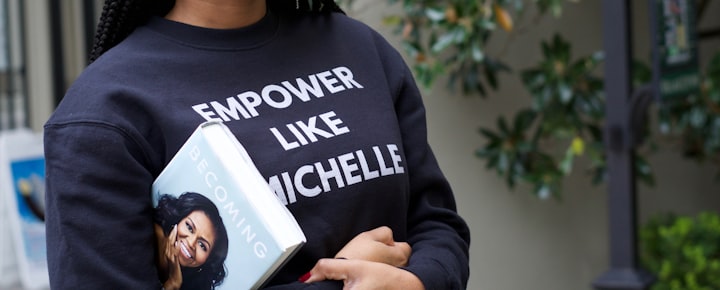The Best Parenting Advice From the Mother-In-Chief
A treasure trove of knowledge nuggets

On the day it hit the bookshops, the women in my life put their Sophie Kinsella on hold to read Michelle Obama’s new book.

They cooed and purred over the pages, I put my earphones in and turned up the music. When they scudded me over the head with the hardback, I grabbed the dog’s lead.
Guys don’t read women’s autobiographies
Men are born, go to school, get a job and then believe stupid things. It’s a wonder how I managed to raise three heart-creakingly handsome and successful kids.
Two years later, Michelle Obama gave her speech. The women in my life were completely focused on the screen. I heard her words — and I was rendered motionless too.
Michelle Obama is a treasure-trove of knowledge nuggets. Her insight illuminated my ignorance. And one short phrase resonated.
“… if we want to be able to look our children in the eye…”
I found my ‘why’.
Regardless of your politics, Becoming by Michelle Obama is a worthy read — I’m no longer that idiot guy.
Michelle Obama is an accomplished person. She is a graduate of Princeton University and Harvard Law School, but being Mom-in-Chief is always job number one for her. Being a mom is a tough gig, but can you imagine raising two children in the White House spotlight?
In her book, and from “The Michelle Obama Podcast,” we get an understanding of the values she learned from her parents, Fraser and Marian Robinson, and how they shaped her perceptive parenting wisdom.
These are the insights of the former First Lady of the United States.
Children live according to the expectations we set for their behaviour
Michelle Obama’s father taught her to work hard, laugh often, and keep her word. It didn’t matter the age of his two children or their abilities, he set raised expectations for their character. And he set Michelle and her brother the same expectations, regardless of their gender.
If you want your child to be patient, treat her as though she is already patient. If you want your child to be honest, treat her as though you expect honesty. If you catch him in a lie say, “That’s not you, what is the matter that you feel the need to lie?”
Give them a sense of identity
Michelle’s mother, Marian, showed her how to think for herself and to use her voice. It does not matter if you come from the south side of the tracks, your story is your story and it has value.
Respect their voice, even as a young girl, Michelle felt empowered because her parents respected her voice. Her family was her world, the centre of everything.
“My parents talked to us like we were adults. They didn’t lecture, but rather indulged every question we asked, no matter how juvenile. They never hurried a discussion for the sake of convenience.”
Think of your kids as smart
Even when they are babies. A two-day-old baby is a smart person. They have personalities. They listen and even before they can talk they have something to tell you.
“He (Michelle’s dad) just decided he was having the smartest kids on earth. That’s the way I thought about you — I thought about you as people who can learn things,” said Marian.
Her mother taught her to read early, walking her to the public library, sitting with her as she sounded out the words on a page.
Michelle said of an incompetent teacher, “Kids know at a very young age when they are being devalued. When adults aren’t invested enough to help them learn, their anger over it can manifest itself in unruliness.”
Be honest with your children about money
“I asked my dad if we were rich. He didn’t rush to an answer. He said to me, Why, what do you think? Do you think we’re rich?”
This was typical of Fraser, he’d repeat the question — it gives you time to think.
“I’m gonna show you. The next time I get paid, I’ll show you how our budget works,” her dad promised.
Friday he laid out what was probably 400 dollars on the bed. And, he said, well, here’s what I get paid. “Oh my god! We ARE rich!” Laughed Michelle.
“Wait, whoa, wait a minute, hang on, we have to pay rent here,” and he takes a few twenties off, and he puts that aside. “That car out there, that costs so we have to pay for that every month, that’s $100 a month,” so he takes another hundred dollars off, and he does this with all the bills, and we get down, to $50.
“And we gotta buy groceries. And we have to buy gas for the car, and you guys like eating out now and then,” so he got down to $20 left for the week. And then he said he had to give us a little allowance. And it basically got down to where there was $10 left.
“Now I left out a very important part,” said Michelle, “because here’s where I get my, sort of fiscal responsibility. Before he did anything, he took out $20 and paid himself and said, that goes into a savings account.”
Appreciate health and encourage fitness
“I think about, how, important sports and athletics, and movement, has been to, our family. How much our dad’s disability played a role in how we value sports, and how we value movement.”
It took Michelle and her brother Craig a while to come to grips with the fact that their dad had multiple sclerosis. Yet, they didn’t really realize that he was disabled until they’d go somewhere, and people would say, ‘hey what’s wrong with your dad’s leg?’
But it didn’t affect what he had to do. He got up and did everything. So, for most of their childhood, they blocked that out. They blocked out the fact that he had a disability until it got progressively worse and he had to use crutches to get around.
You don’t really notice your health until it’s gone. Encourage children to run around and have fun. It doesn’t matter what sport or exercise it is, let them try everything until they find something they can’t do without. Then staying fit is easy — it is just what they do.
Teach self-reliance to get resilience
When her kids’ alarm clocks rang in the morning, her mother used to tell them, “You can lay in the bed if you want, I already have my education.”
Michelle learned to take responsibility for herself.
“I always felt like, I’m getting up for me,” she said. “I’ve gotta get ready to go to school, not because my mom is making me do it, but because she’s told me that I’m responsible for my education.”
Her parents made sure she understood that she was responsible for her own behaviour.
Michelle’s parents made their children’s successes and failures their own. Michelle said to her mum, “You were always there for us, but you believed that you get good grades for you, not for me. You never celebrated our victories too much, or wallowed in our failures too deeply.”
Her dad was the glue for the entire family. Not just his children, but for mom’s side of the family too. “He was the patriarch. People came to dad because dad couldn’t come to everybody, so that made our house a hub, in so many ways.”
When they lost him, it threw them for a second. Their core was missing. So, they had to rebound and remember all that he taught them. Losing their dad was not an excuse. To keep going, they had to be consistent about setting up rituals and routines.
If you want normal kids, treat them normal
Although she was the First Lady, she resolved to treat her girls and their activities like she was a regular mom.
“That just came with it, it was like, if they’re going to be normal, we have to be normal parents. We made sure they had responsibilities, we had to institute rules that the housekeepers couldn’t clean the girls’ rooms, and they had to make up their own beds. They had a set of chores.”
When she grew up, she and her brother had their own set of responsibilities. Michelle had to clean the bathroom, they each had to do the dishes, and her brother had yard duty, cut the grass, rake the leaves.
Michelle has given her kids these responsibilities, even at the White House. She has tried to recognize her girls, Malia and Sasha, as individuals.
“You gotta give your kids space to be who they are not the kid you want.”
Show up
“What dad showed us, is that in order to build, meaningful relationships with people you have to show up for them. Relationships, whether it’s sibling, parent-child or friends, they don’t happen through osmosis, they happen because they decide to be very deliberate about connecting with people.”
The connection can look like a bun-bunch of different things. It can be a phone call, it can be a text, it can be a whole dinner or set of conversations. Nothing replaces getting on the phone and calling somebody — it’s called showing up.
Plan and encourage your children to go further
Sitting on a stoop with her extended family, one cousin asked Michelle, “How come you talk like a white girl?”
There was no denying it. Michelle spoke differently than some of her relatives. Her parents had drilled into her and her brother the importance of using proper diction, of saying “going” instead of “goin” and “isn’t” instead of “ain’t.” They taught her to finish her words.
They meticulously corrected their grammar and admonished them to enunciate their words.
“The idea was we were to transcend, to get ourselves further. They’d planned for it. They encouraged it. We were expected not just to be smart but to own our smartness — to inhabit it with pride — and this filtered down to how we spoke.”
Final Thoughts
Michelle credits her mother, Marian, for having the sort of parental mindset that she recognizes as brilliant and nearly impossible to emulate.
Marian was persistently calm, neither quick to judge nor quick to meddle. “She monitored our moods and bore benevolent witness to whatever travails or triumphs a day might bring.” When things were good or bad, she displayed enough to know she was happy or compassionate.
Marian dispensed advice as matter-of-fact. “You don’t have to like your teacher, but that woman’s got the kind of math in her head that you need in yours. Focus on that and ignore the rest.”
In the same hard-boiled way, don’t come complaining about your kids. Michelle has got the kind of parenting wisdom in her head that we all need. Focus on that and ignore the rest.
About the Creator
Malky McEwan
Curious mind. Author of three funny memoirs. Top writer on Quora and Medium x 9. Writing to entertain, and inform. Goal: become the oldest person in the world (breaking my record every day).






Comments
There are no comments for this story
Be the first to respond and start the conversation.